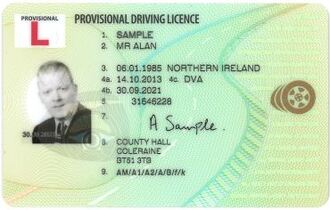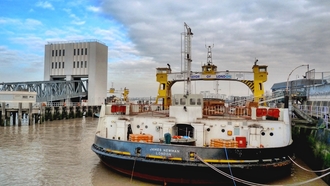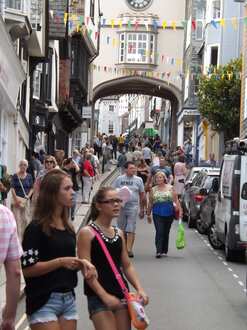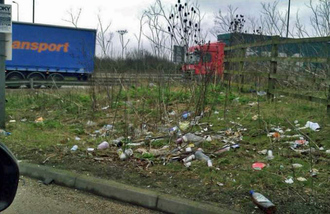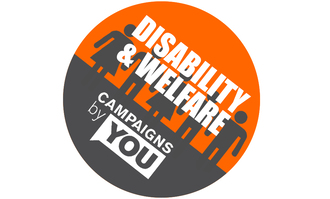-
20mph speed limits and traffic control on Weston EstateWe need to bring the 20mph zones to a part of Otley that has so many young families, along with traffic calming measures and assurances from local police that they will also work alongside the council. The rest of Otley has the 20mph zones so its time to bring the whole of Ashfield in line.... lets not let it take a serious accident.140 of 200 SignaturesCreated by Gareth Dibble
-
School Buses for the children of MiltonIt is not a safe walking distance for the children. The children have to walk through rival areas which could/would lead to gang fights. There are very busy roads if the children had to walk.704 of 800 SignaturesCreated by Sarah McQueen
-
Northern Ireland Licence FeesDriving is a skill that most people will need in there life and to be charge almost double the price of the rest of the UK, Northern Ireland is being treated unfairly and it will put off people wanting to learn to drive. Not everyone can afford £62.50 for a first NI Provisional so it would be beneficial to reduce the price so that it is in line with the rest of the UK at just £32 for a first GB Provisional3,116 of 4,000 SignaturesCreated by Russell Hearn
-
Please help save St Cuthbert's School Bus ServiceIt is very important to all familes who use this service. There are parents who start work early, parents who have to take another child to a different school plus the parents who have no personal transport at all! The local traffic is also reduced as a result of parents using this bus service. This traffic will increase significantly for everyone on the school run by having at least another 20+ cars on the road in an already extremely busy village.102 of 200 SignaturesCreated by Ursula Whooley
-
Mitigate the traffic and rage issues on East Farleigh bridge6,840 motorists use the bridge every day, (feasibility study Nov 2012) East Farleigh is a charming, quaint village with the added treasure of a boating community. The anomaly is the difficulties motorists suffer on the medieval bridge. The traffic congestion is compromising the 14th century medieval bridge and footpaths. Creating noise pollution, damaging a restored converted Victorian train house, exhausting the residents, reducing the value of house prices and house sales, stressing the daily commuter, vulnerable road users, emergency services, local businesses and school children. The visibility either side of the single track ancient bridge is limited, so cars will begin to cross the bridge and meet in the middle, causing traffic jams and aggravated assaults where motorists are unable to reverse off the bridge to allow the other to proceed. There is an alternative bridge which should be considered in reducing the traffic flow. The unnecessary321 of 400 Signatures
-
Save The Woolwich Free Ferry!There has been a free ferry running here for over 100 years and an established ferry service on the route since the 14th century, with mentions of one in the Doomsday Book. London has many traffic congestion problems, but the problems of the Woolwich Ferry are not it's own; it is an effective and much used (2,000,000+ journeys per year) piece of infrastructure in its own right. The problem of the Woolwich Ferry are in reality the problems of the Blackwall Tunnel and it is only when the Blackwall Tunnel fails that the area around the Woolwich Ferry becomes overly congested. To close one thing that works well because something else does not is evidence of poor strategic thinking. Even if a new bridge or tunnel are built as proposed by TFL, congestion is only going to increase year-on-year in East London. this means that the Woolwich ferry does not stop being relevant or strategically important, both as a crossing in it's own right or as an additional means of easing congestion when a single car or lorry (inevitibly and regularly) breaks down in the existing tunnel (or on a new bridge) and brings this part of the capital to gridlock. If East london actually needs additional crossing capacity, why dispense with this vital piece of existing infrastructure? There is a historic precident for the Woolwich Ferry and currently TFL has an obligation to provide this service. This obligation should remain for the benefit of both vehicular and pedestrian transport, the latter of which would be severely disrupted by the provision of vehicle only crossing points. Furthermore the obligation to continue the service is important because a FREE ferry service is the only egaliarian means of river transport in East London- it's dissapearance would mean that all traffic on the river would become a privatised, fee paying entity. In an area which has so much maritime heritage, this you be a tragic development and a loss to future generations.11,294 of 15,000 SignaturesCreated by Graham Ward
-
Burton on Trent Road surface problem!!!!this is important because a good road surface will keep the residents of Burton safer will cause less damage to our cars vans & motorbikes. Also to stop any injuries to cyclists who have to use the roads too. We deserve better roads and we will campaign to get it done!384 of 400 SignaturesCreated by Alex Eaton
-
Save our Free School TransportI strongly believe that this increased distance is to far too expect a child to walk to school, never mind the weather conditions such as the rain and snow. Our children will be tired, cold and maybe even soaked through before they even start school. How can we then expect our children to be able to learn when tired, cold and wet? Thanks to the council amalgamating many schools, the distance that need to be travelled are now much further for many pupils. Many of the children will have to leave the house around 7.30 am to arrive at school for 8.40 and then will not get home until after 4 pm on the days they finish at 3 pm and after 5 when they finish at 4 pm. This would mean that in the winter months they will be expected to walk in the dark under the underpasses and unsupervised as many of the parents will be at work. This is not to mention the overly heavy school bags that they are expected to carry which would also add to tiredness, increased stress and potential health problems such as bad backs, posture and sore feet. Furthermore the children are then expected to complete homework whilst tired and with dramatically compromised concentration levels. Many of the routes to the schools do not have adequate pedestrian walk ways and many areas do not benefit from having regular public buses which can transport children to school. On a normally day the amount of traffic in and around our schools is already extremely heavy. If these plans are approved then there is likely to be more congestion and more danger as parents are forced to transport their children to school themselves. Many parents will simply not be able to ensure that their children can get to school safely as they will have to leave early themselves, to get to work. This will impact family life as the parents may have to reduce their working hours or give up work completely.996 of 1,000 SignaturesCreated by Katie King
-
Don't let rat-runners ruin Totnes!Overturning the RTO would mean a return to rat-running cars that speed through and pollute our streets. Recent figures show that the number of cars driving through the town centre is down by at least 50%, whilst total car parking figures are virtually unchanged. We believe that this historic town has now become a far more pleasant and healthier place for shoppers, visitors and residents. (Photo shows the current relaxed ambience that attracts hundreds to the High Street)759 of 800 SignaturesCreated by Julian Hall
-
Keep Winchester's roads free from litter!Our city is surrounded by beautiful countryside yet the quality of the environment is seriously compromised by the level of litter that is allowed to build up on our roads. Enough is enough.339 of 400 SignaturesCreated by James Miller, Dirty Money Campaign
-
Put speed camera on hallfields road1.cars do 50mph down here 2.A49 has speed cameras59 of 100 SignaturesCreated by Mary Leigh

-
Allow Carers use of the Blue Badge SchemeWhen the Blue Badge Holder is admitted into hospital, his/her carers responsibilities are reduced, however, in order to visit, the disabled person in hospital, the carer must pay full parking charges, which can be £12 a day. The carer may only use the Blue Badge if the disabled person (Blue Badge Holder) is being dropped off or picked up. As Carers Allowance is only £61.35 a week, after some 5 days of visiting the carer is "out of pocket", whereas some hospital car parks are free for Blue Badge Holders.The financial burden, upon the carer, when the disabled person is discharged from hospital, can be quite harsh, especially if the carer has had to pay for parking.739 of 800 SignaturesCreated by Peter George
Hello! We use cookies to improve your experience by providing insights into how the site is being used. Find out more.


